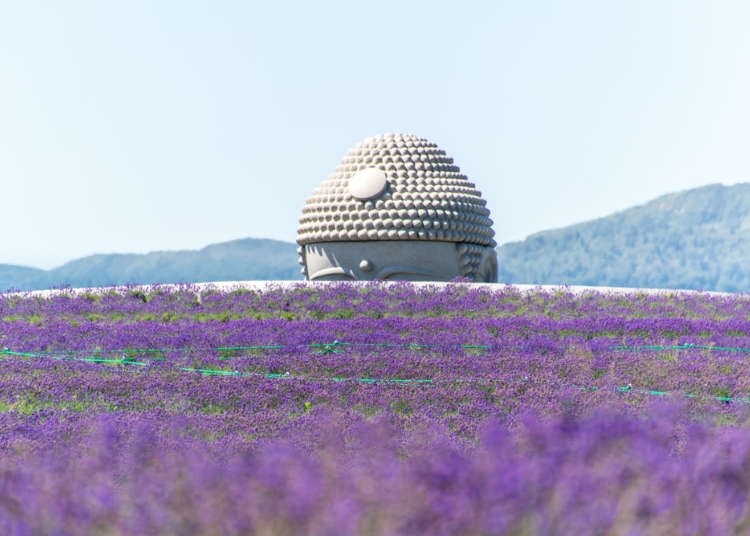
Walking around Makomanai Takino Cemetery, located in Hokkaido Prefecture’s Sapporo City, you will see just the head of a large buddha statue from afar. Many tourists are surprised at the Atama Daibutsu statue's entirety once they get a closer look.
Huge, historical buddha statues can be found throughout Japan. Some examples include the Great Buddha in Nara and the Great Buddha of Kamakura. Even from a distance, most of these statues can be seen standing majestically.
Also popular among foreign tourists, here we will introduce this large and unique monument known as the Hill of the Buddha!
Tanasut Chindasuthi / Shutterstock.com
The Mysterious Hill of the Buddha: Find a Monument Designed by Tadao Ando in a Cemetery
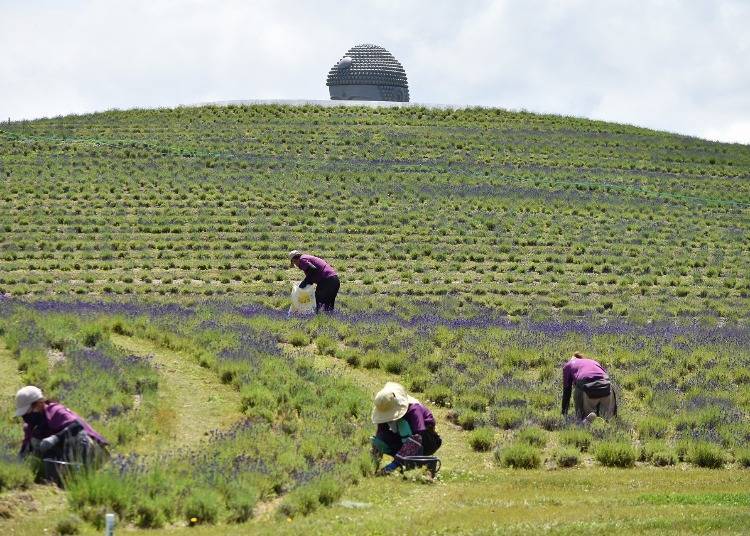
Daibutsu, or Great Buddha, is the name for large statues of buddha made to honor the Buddhist religion and its traditions.
The first Great Buddha is said to be built by Emperor Shomu in Todai-ji Temple during the Nara Period (year 710 through 784). After the construction of the first statue, many others were built throughout different regions in Japan.
Peeking its head over fields of Hokkaido lavender, the Hill of the Buddha is a monument in Mokomanai Takino Cemetery located in Hokkaido Prefecture’s Sapporo City. This monument was completed in 2016 as a way to commemorate the cemetery’s 30th anniversary.
It was designed by Tadao Ando, an architect famous for working on many creative buildings both within and outside of Japan.
Examples of his works include the Japanese Pavilion for the Seville Expo in 1992 and the Pulitzer Arts Foundation in the United States.
The statue was named Atama Daibutsu because only the statue's head (atama) peeks out from the dome-shaped roof.
Makomanai Takino Cemetery is the largest cemetery found in Sapporo City. Run by a public interest corporation, this large space is decorated with flowers and greenery. It offers an overall soothing and peaceful atmosphere.
Contrary to traditional cemeteries, it’s more welcoming due to its many monuments, including Moai statues, a replica of Stonehenge, and the Hill of the Buddha. Because of this, people come to this cemetery not only to visit the graves but also to visit the monuments as a tourist.
To get to Makomanai Takino Cemetery, take the Nanboku Line from Sapporo Station and get off at the last stop called Makomanai Station. From there, take either the free shuttle bus or the local 108 bus for 20 minutes. (See complete directions here.)
Prepare to Be Greeted by Moai Statues When Entering Makomanai Takino Cemetery
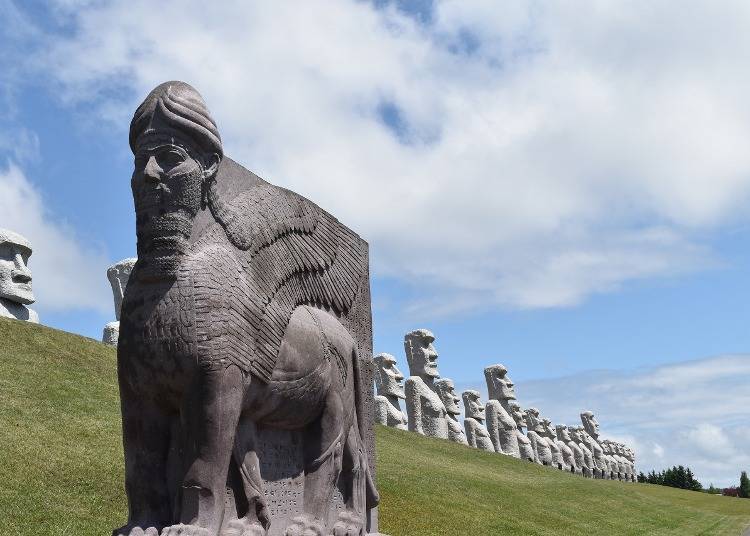
Once arriving at Makomanai Takino Cemetery, you will be greeted by rows of Moai statues. This surprising sight initially has many of its visitors questioning whether they’re really in a cemetery.
Although it wasn’t built for religious purposes, the mo in moai stands for the future, and the ai stands for living. At this cemetery, these symbolic statues are a place where you can enjoy a moment of silence.
The largest statues are 9.5 meters tall and weigh 120 tons, and even the smallest statues are around 6.5 meters and weigh 60 tons. The scenery here will leave you in awe.
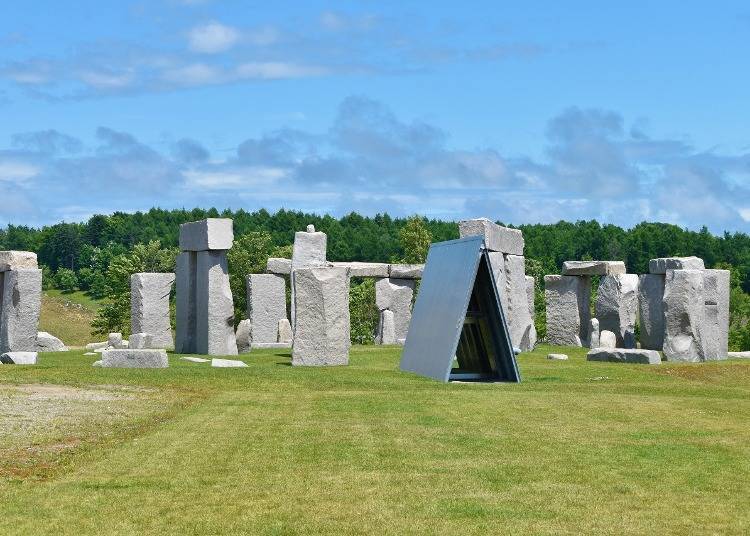
Japanese cemeteries usually have square gravestones placed close to each other. However, the Makomanai Takino Cemetery spans approximately 18 million square meters and has several different monuments and graves. After stopping by the Moai statues, you’ll come across a monument reminiscent of Stonehenge in the U.K.
At a glance, this monument doesn’t seem like it has any religious ties. However, it actually serves as an eitaikuyou or a type of Japanese grave that’s taken care of and maintained by the cemetery. The innovative concept of this grave is quite astonishing.
Enjoy the Unusual View of a Buddha Head Peeking Over Fields of Lavender
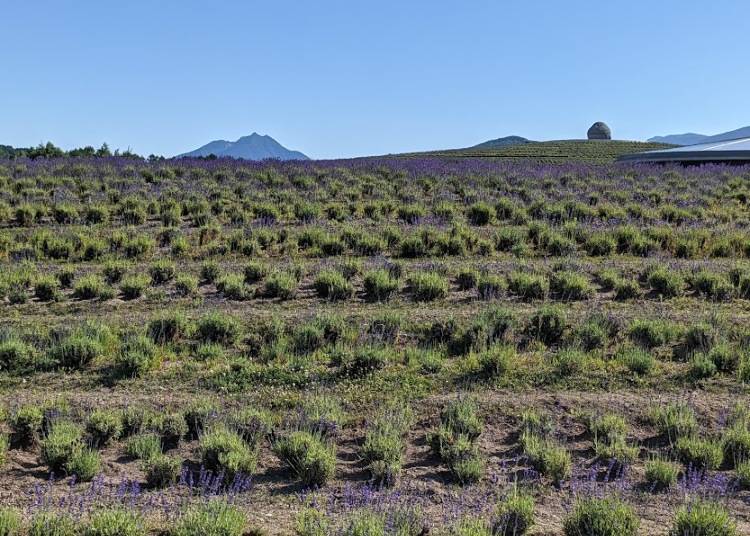
Here you can find the head of the Atama Daibutsu peeking out from above the lavender hills. As you get closer, the Hill of the Buddha starts to appear. This view is other-worldly.
It’s proudly designed by Tadao Ando, an architect that has designed many buildings within and outside of Japan. The Hill of the Buddha was built as a way to commemorate the cemetery’s 30th anniversary. With construction beginning in October 2013, this large project took approximately three years to complete.
Having abundant greenery perfect for walks, rest stops, and other recreational facilities, each sacred monument was built to highlight the park-like qualities of Makomanai Takino Cemetery. The Hill of the Buddha is one of these sacred facilities and monuments.
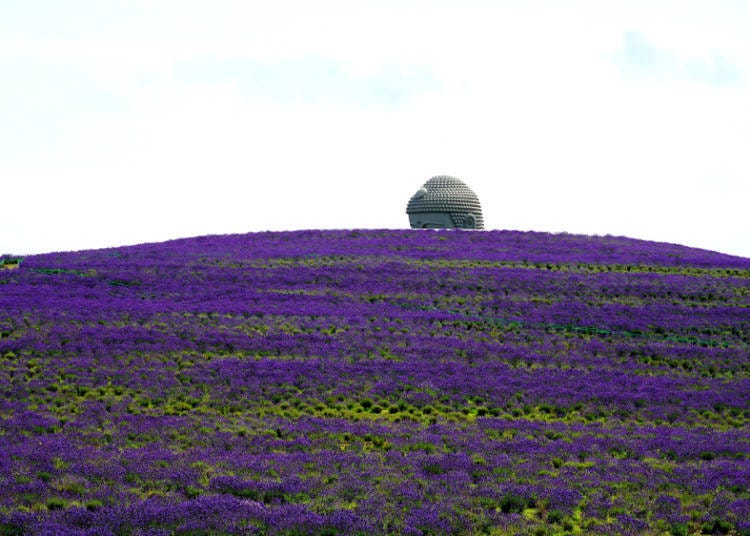
Using the pre-existing great buddha statue as a base, a dome surrounding the statue was built. After this, dirt was added to the dome to make it into a hill.
Once this was finished, the Hill of the Buddha was complete. The most challenging part of the process was planting 150,000 lavender plants on the hill. With advice from lavender farmers and other volunteers, seeds were planted to create a beautiful lavender field.
Make Your Way to a Spiritual Spot Near the Hill of the Buddha
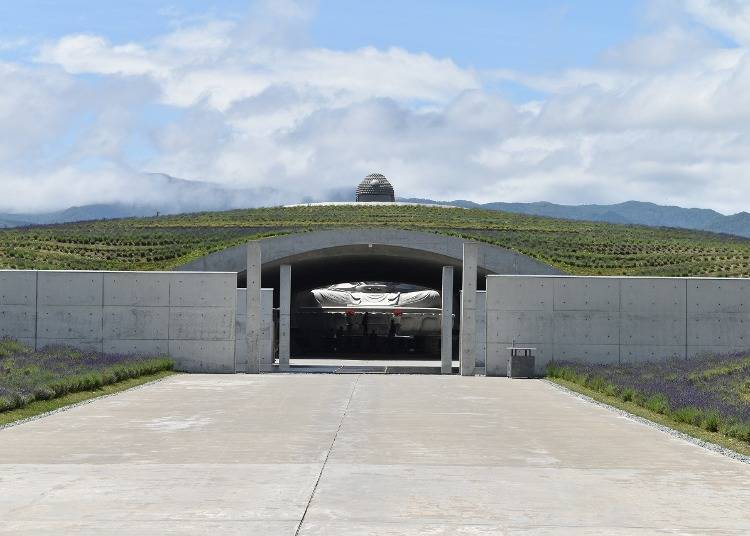
The path that leads to the Hill of the Buddha is an incredibly spiritual place. It strangely pulls you straight towards the direction you need to go.
The fact that you can’t see the entire path leaves what awaits ahead up to the imagination. Once you get closer, you can feel the solemn atmosphere that surrounds the Atama Daibutsu.
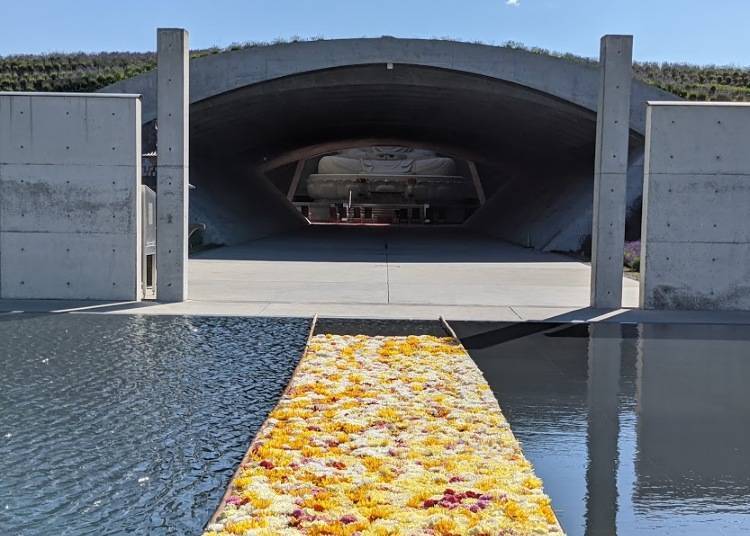
Once at the end of the path, a garden on the water appears in front of you. This is a classic Tadao Ando design. In addition to this monument, he has also designed other facilities near the water in areas such as Osaka Prefecture and Venice.
For a limited time, you can enjoy an event where approximately 4,600 flowers float on the water’s surface, creating a path.
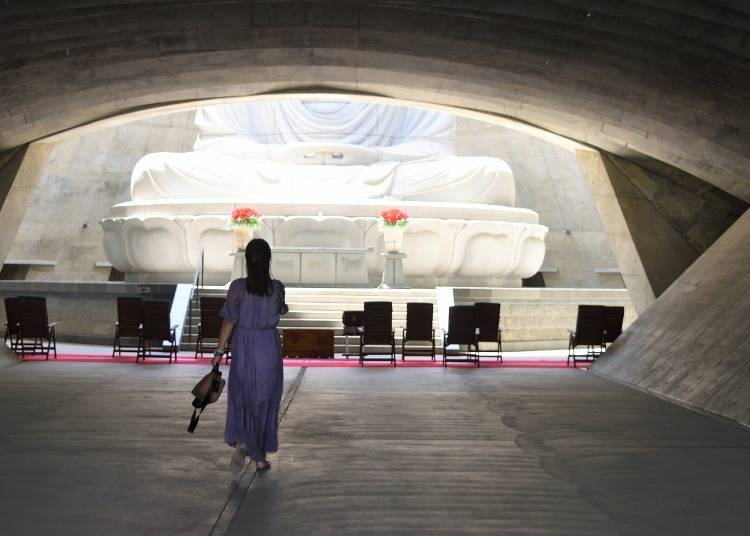
Once past the water garden, you will enter a tunnel with a womb-inspired design. As you move forward, the statue unveils itself little by little. Finally, you are greeted by the full statue enveloped in beams of light from the sky.
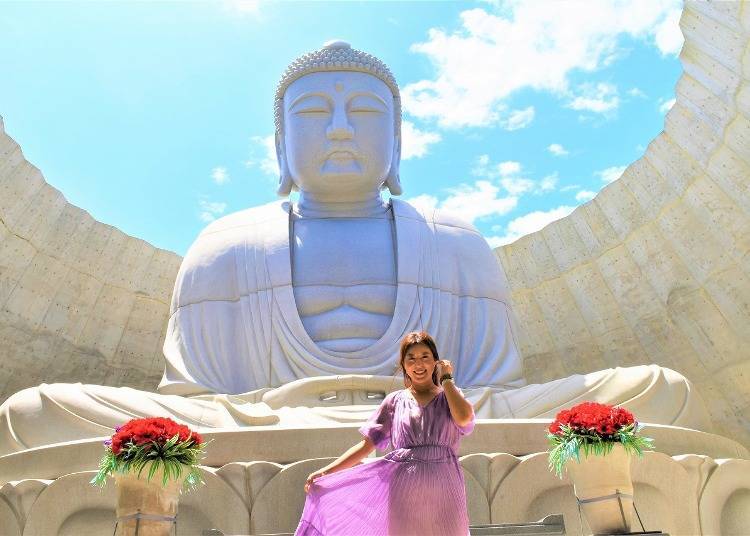
Under a blue sky, the Hill of the Buddha enshrines a large buddha statue made from stone. Both profound and dignified, it’s 13.5 meters tall, weighs a total of 1,500 tons, and is made out of 57 parts. It’s a popular tourist attraction especially among visitors from Asia.
What’s more, you can write your wishes on an ema, a votive tablet decorated with horse drawings, or draw a paper fortune. Although both of these activities cost a fee, the proceeds are used to maintain the condition of the cemetery’s grounds.
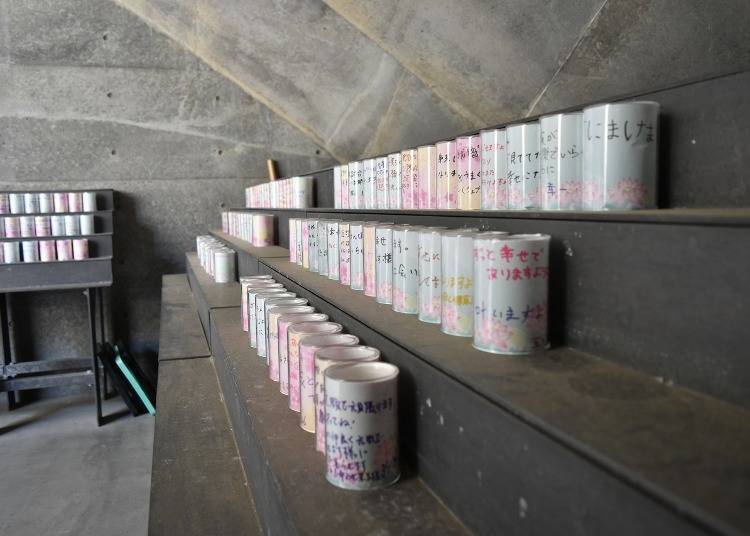
On message lanterns, the desires and wishes of those who visit are written. Most of these messages wish for the health of family and loved ones.
Photo Spots at the Hill of the Buddha
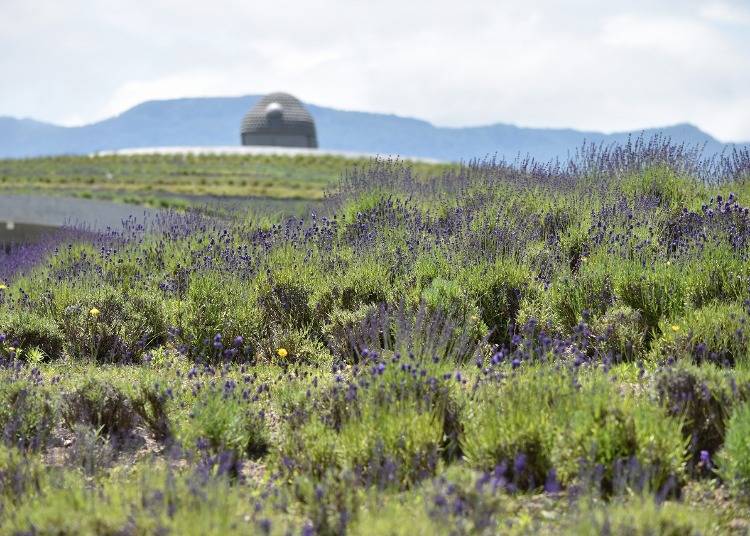
You can find beautiful scenery and views around the Hill of the Buddha year-round. In spite of this, visiting in the summer when Hokkaido lavender plants bloom is especially recommended. From mid to late July, the entire hill surrounding the statue becomes purple and is enveloped in a perfume-like fragrance.

Furthermore, you can add some vibrancy to your photos of the Hill of the Buddha by including flowers in your shot. Dandelions that bloom along the bank between the Hill of the Buddha and the stone circle make for a nice addition.
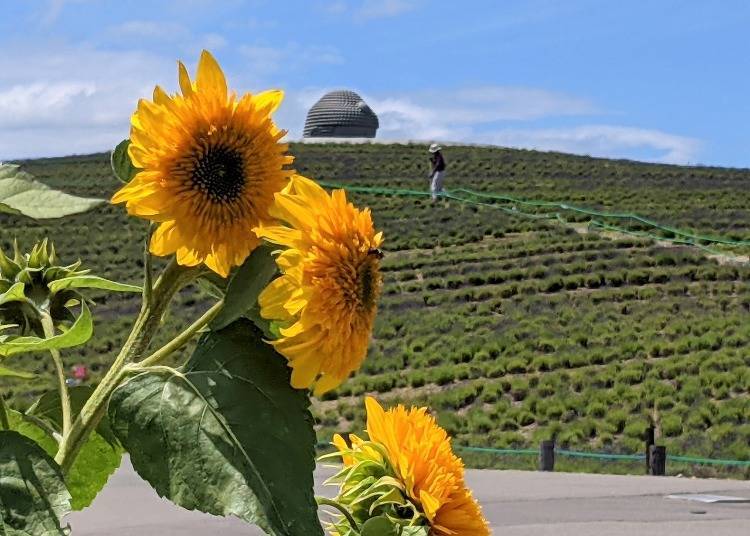
The flower market, located on the side of the cemetery where you can find the parking lot, is also an excellent place to take photos. Here, the contrast between lavender and sunflowers are quite charming.
Scenic Views You Can Enjoy in the Winter
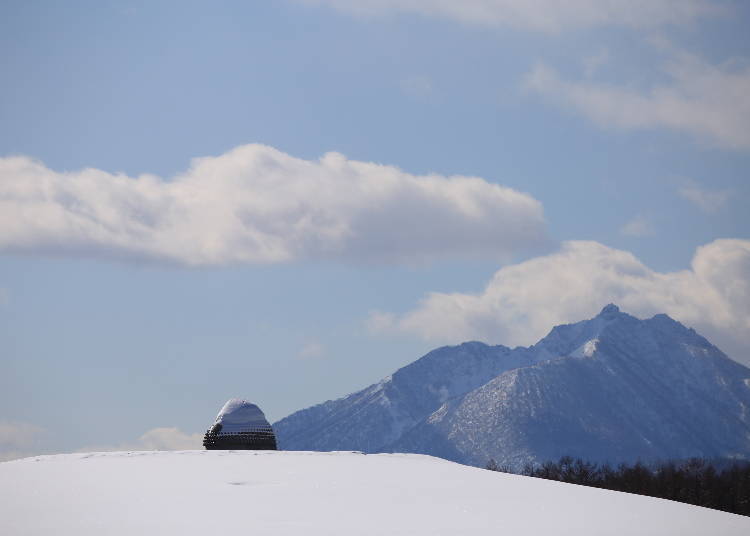
Lavender fields are beautiful, but snowscapes also can’t be missed! Snow covers the head of the Atama Daibutsu, making it seem like the statue is wearing a hat. Here you can enjoy fantastical winter views such as this and many more.
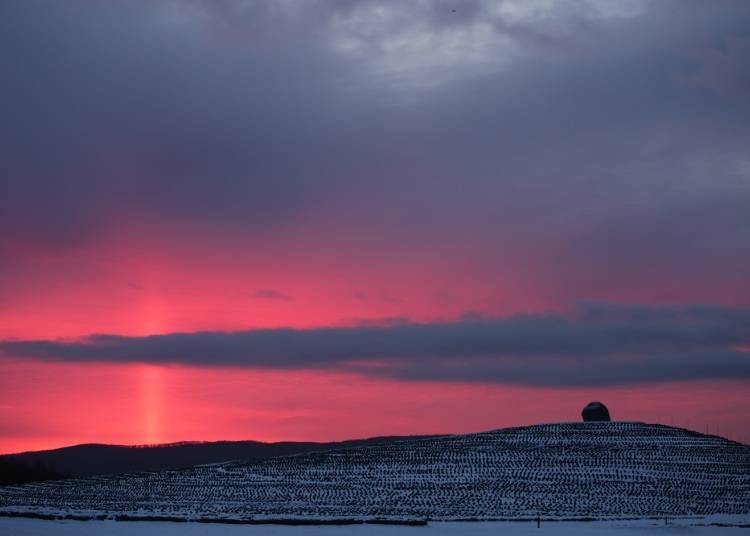
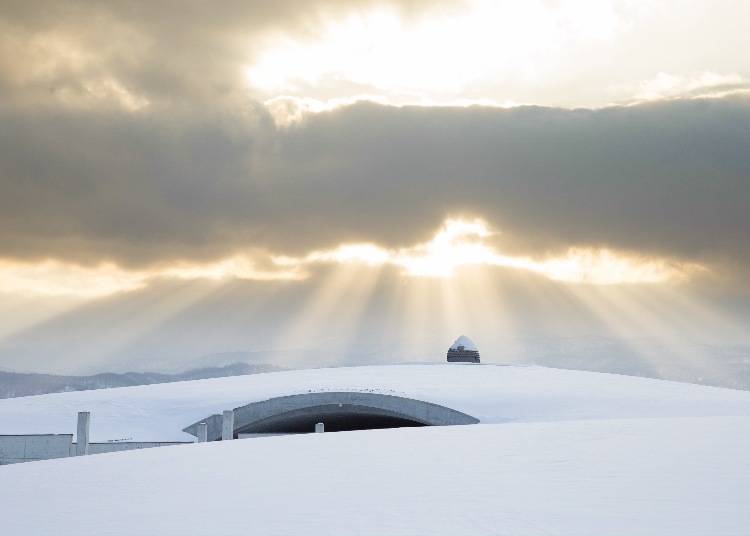
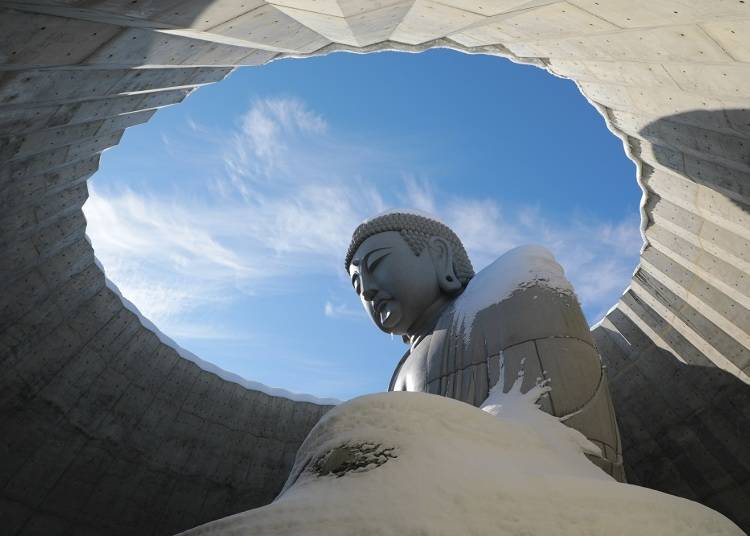
Lunch at Rotunda Cafe and Store
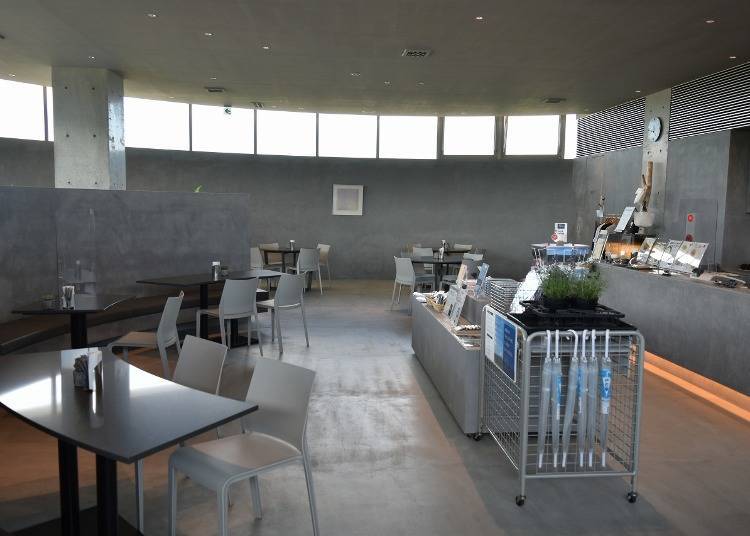
When hungry, please stop by Rotunda Cafe and Store located inside the Hill of the Buddha. In addition to pasta, udon (thick noodles made from buckwheat flour), light meals, and coffee, you can also enjoy ice cream from the ice cream shop Missu-house. You can also get your ice cream to-go to eat inside your car or bus.
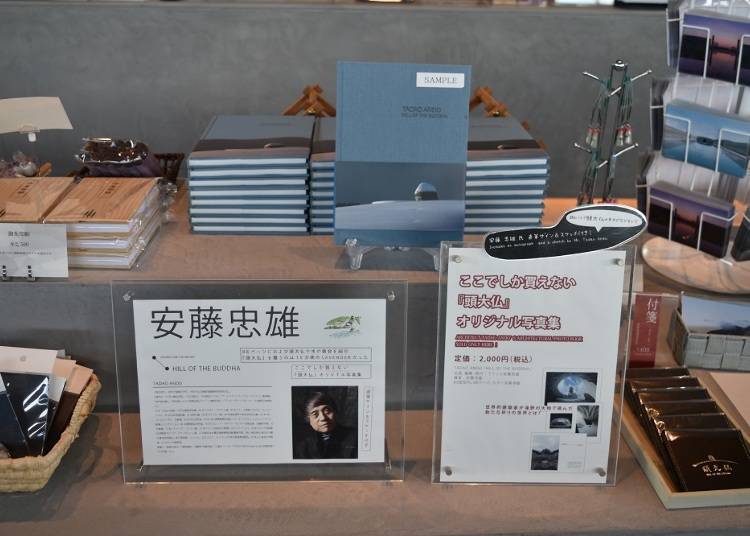
Additionally, original items at the Hill of the Buddha, such as t-shirts and folders, are sold. You can also find Hill of the Buddha-themed photobooks with explanations in both English and Japanese. This is a record of Tadao Ando’s vision to create a place of reverence and prayer in the cemetery. It’s a book only available at this shop.
Lavender Festival on the Promenade: Enjoy this Limited Time Event!
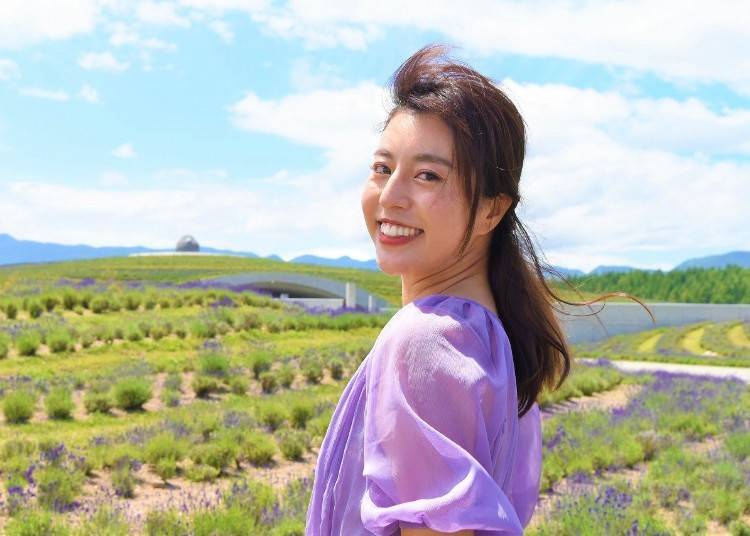
For a fee, you can also enjoy the lavender festival on the promenade during lavender season in July. This is held for a limited-time on Saturdays, Sundays, and holidays. The promenade ticket (500 yen including tax) comes with a lavender picking ticket. If you have the chance, please feel free to join this event!
A Place that Purifies the Soul
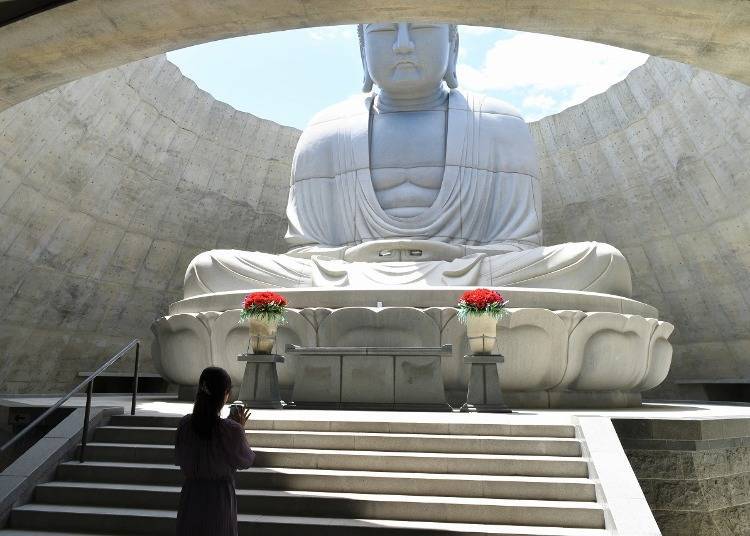
Beginning with the Hill of the Buddha, there are many extraordinary monuments to discover. These sites might cause you to end up forgetting that you’re in a cemetery. Some may worry whether it’s okay for tourists to visit a cemetery where souls are buried.
Regarding this issue, Makomanai Takino Cemetery is a cemetery park that doesn’t question the beliefs of its guests. It welcomes its visitors and hopes that people can appreciate its charm.
Even though the hill of the Buddha has a powerful presence, it still feels welcoming. Your soul will feel purified just by getting close to it. Please add this monument to your list of places to visit in Sapporo.
Services for Foreign Tourists
Pamphlets in English are available.
-
Makomanai Takino Cemetery真駒内滝野霊園
- Address 2 Takino, Minami-ku, Sapporo 005-0862
・TEL: 011-592-1223 (Reception Hours: 9 AM - 4 PM)
・Hours: April-October 7 AM - 7 PM, November-March 7 AM - 6 PM
・Hill of the Buddha Visiting Hours: April-October: 9 AM - 4 PM, November-March: 10 AM - 3 PM
・Admission: Free
・Closed: Open daily
Model: Mai Hashimoto
Text by: Masakazu
*This article was originally published in July 2021 and updated in May 2024. For updated information, please check the official websites listed.
*Prices and options mentioned are subject to change.
*Unless stated otherwise, all prices include tax.
Popular Tours & Activitiess
Recommended places for you
-
Appealing

Mt. Hakodate Observatory
Forests & Mountains
Hakodate
-
Appealing

Rukku and Uohei
Izakaya
Sapporo / Chitose
-

Farm Tomita
Other Nature
Furano / Biei / Sounkyo
-
Appealing

Asahiyama Zoo
Zoos, Aquariums & Botanical Gardens
Asahikawa
-
Appealing

Shirogane Blue Pond (Aoiike)
Rivers, Lakes & Canyons
Furano / Biei / Sounkyo
-
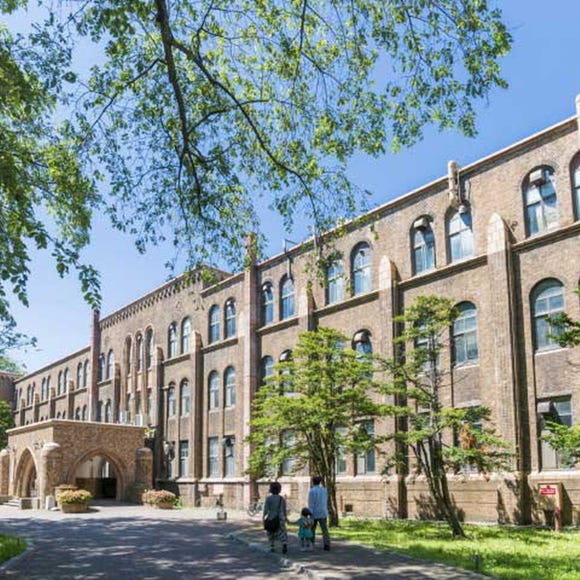
Hokkaido University
Other Architecture
Sapporo / Chitose
-
Ad

Sapporo SATUDORA Shopping Guide: Get Souvenirs, Medicine & More at This Iconic Drugstore (Special Deal Inside!)
-
Ad

Welcome to Sapporo! Here’s How to Expore the Ciy Like a Local
-

7 Iconic Hokkaido locations that will make your Instagram shine
by: Himanshi Shah
-
Ad

Explore Eastern Hokkaido from Tancho Kushiro Airport: Your Gateway to Grand Nature
-

Explore Japan in 7 Days: The Ultimate Local Rail Adventure with the Hokkaido & East Japan Pass
by: Guest Contributor
-

Jozankei Onsen: 10 Luxurious Hotels with Private Hot Springs & Stunning Views Near Sapporo
by: Robotan
-

Top 5 Things to Do in Hokkaido's Biei and Furano Area: Shirogane Blue Pond, Lavender Fields, And More!
-

Fun Spring Festivals and Events in Hokkaido (April and May 2024)
by: Masakazu Yoshida
-

(Video) Walking Tour along Narita Omotesando - Quaint Historical Village near Narita Airport!
by: Victor Gonzalez
-

Sapporo New Chitose Airport (CTS): Complete Guide to Restaurants, Souvenirs, Shopping & More!
-

Kichijoji – Explore Tokyo’s Top-Rated Stylish Suburb in Half a Day!
-

What to Pack for Japan: 8 Essential Things for a Hassle-Free Trip
- #best sushi hokkaido
- #things to do hokkaido
- #best ramen sapporo
- #what to bring to japan
- #new years in tokyo
- #what to buy in ameyoko
- #japanese nail trends
- #what to do in odaiba
- #onsen tattoo friendly tokyo
- #daiso
- #best sweets otaru
- #japanese fashion culture
- #best nature furano
- #japanese convenience store snacks
- #best japanese soft drinks












